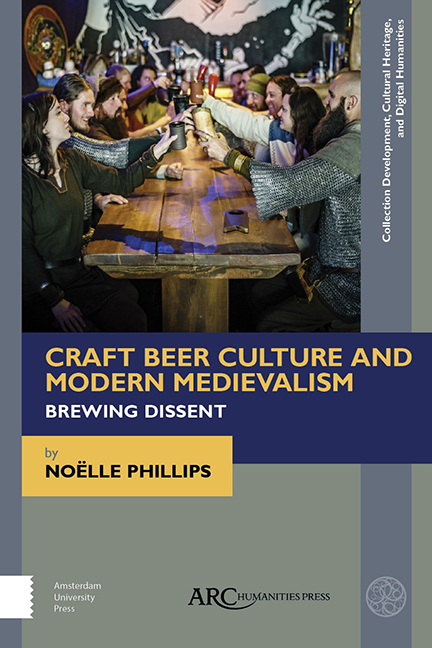Book contents
- Frontmatter
- Contents
- List of Illustrations
- Acknowledgements
- Chapter 1 Introduction: Medievalism and Craft Beer
- Chapter 2 Reading Beer in the Middle Ages
- Chapter 3 Resistance and Revolution: Craft Beer Versus Corporate Giants
- Chapter 4 Beer Heroes and Monastic Medievalism
- Chapter 5 Militant Medievalism: Norsemen, Mythology, and Masculinity
- Chapter 6 Pale Ales and White Knights: Craft Brewing, Whiteness, and Medievalism
- Chapter 7 Conclusion: The Alchemy of Alcohol
- Select Bibliography
- Index
Chapter 6 - Pale Ales and White Knights: Craft Brewing, Whiteness, and Medievalism
Published online by Cambridge University Press: 20 November 2020
- Frontmatter
- Contents
- List of Illustrations
- Acknowledgements
- Chapter 1 Introduction: Medievalism and Craft Beer
- Chapter 2 Reading Beer in the Middle Ages
- Chapter 3 Resistance and Revolution: Craft Beer Versus Corporate Giants
- Chapter 4 Beer Heroes and Monastic Medievalism
- Chapter 5 Militant Medievalism: Norsemen, Mythology, and Masculinity
- Chapter 6 Pale Ales and White Knights: Craft Brewing, Whiteness, and Medievalism
- Chapter 7 Conclusion: The Alchemy of Alcohol
- Select Bibliography
- Index
Summary
IN 2009, GREG Koch, CEO of Stone Brewing, produced a video titled “I am a Craft Brewer” that preceded his keynote address at that year's Craft Brewers Conference. The Vimeo caption describes the project as “a collaborative video representing the camaraderie, character and integrity of the American Craft Brewing movement [with] more than 35 amazing craft brewers from all over the country.” It is indeed an inspirational video, reinforcing the tropes of freedom, courage, and resistance for which the craft-brewing industry is known. One statement, however, struck me as oddly unselfconscious: “We are small, community-supportive, authentic, local, and diverse” (1:09– 1:15). Each term in this list made sense until the last one: diverse. The video included approximately thirtysix men and seven women (three of whom did not speak, or hardly spoke). Every single one of the brewers who appeared, male and female, appeared to be Caucasian.
Seeing Whiteness
The whiteness of the craft-brewing industry— the fact that it seems “a bit too pale and male”— is beginning to be more openly recognized, although it is slow to change. Daniel Bedsaul argues that despite the revolutionary language that infuses the industry, it is highly conventional regarding gender and race, with the vast majority of consumers being male and white. Erik Withers points out that approximately 80 percent of craft beer consumers are white and upper-middle class and argues that, “despite some minority involvement, craft beer culture is informed and defined by whiteness.” Withers’ statement may seem provocative, particularly because the craft beer industry is predicated upon an ethos of equality and the principle that good taste is not aligned with ethnicity, gender, or class. The politics of craft beer generally lean towards the left, with interests in social justice and community involvement informing many brewers’ business structure and branding. However, the way nostalgia, nationalism, and masculinity have shaped the industry reveals the ease with which whiteness, a category discussed in the following pages, is naturalized and integrated. As this chapter explores, the concepts of nostalgia, nationalism (via colonialism), and masculinity, at least in their invocation in North American craft beer circles, are often the products or imaginings of a culture built on the power of whiteness. The inevitable discomfort this acknowledgement of whiteness evokes in an industry that strives for inclusivity is important and must be faced.
- Type
- Chapter
- Information
- Craft Beer Culture and Modern MedievalismBrewing Dissent, pp. 115 - 136Publisher: Amsterdam University PressPrint publication year: 2019



